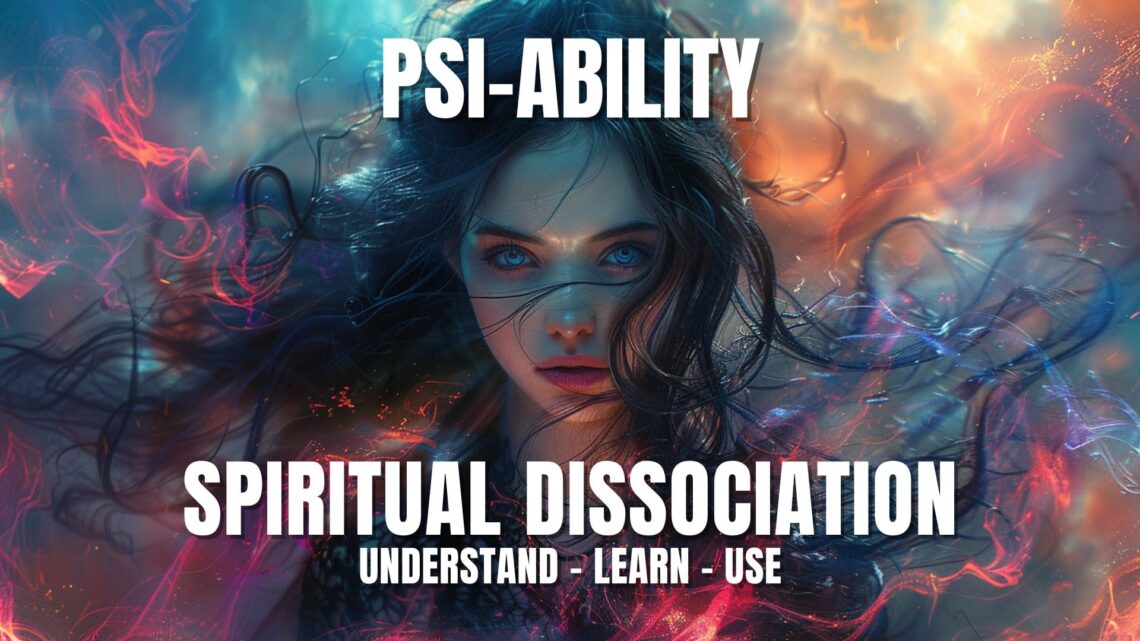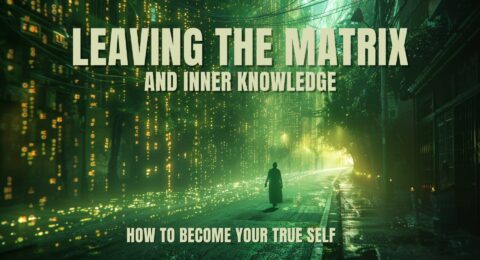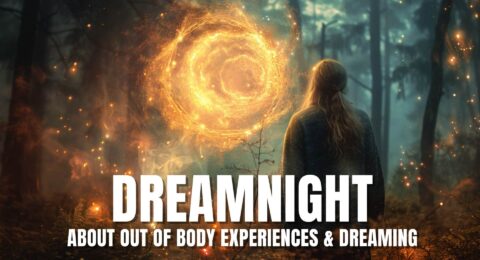
Dissociation: Psychosis, Halluzinations and get stuck in another World
Occasionally it is reported that people have triggered psychosis by dissociation or by certain substances. Here is an explanation of what actually happened….
Psychosis is most often defined in psychiatry as experiencing hallucinations, delusions, loss of reality, and/or ego disturbance. Some also report possessing the feeling of having “switched” reality and then being “stuck” in it and unable to get out of it.
Just listing these symptoms possess a negative character and induce something detrimental or ill, which is not good for the psyche at all. So, first of all, it is appropriate to clarify what the terms mentioned by psychology actually mean:
Hallucinations are extrasensory perceptions
Hallucinations are perceptions that only the affected person perceives, but everyone else in the immediate environment does not. Delusions, talking to angels or beings that no one else can see or hear. Perceiving visions about the future that should or could occur.
Interestingly, however, people who experience so-called “hallucinations” often perceive the same elements. If a hallucination were a false source of information, invented or spontaneously distorted, then it is surely surprising why many people with hallucinations always register very similar things. Wouldn’t it then be that hallucinations would have to be arbitrarily and completely different from those of others? Why then, independently of each other, are similar things perceived?
Hallucination is a camouflaged term, which is supposed to disguise what is really going on. Actually this term should be changed to: Perceptions beyond the 3D reality or the physical everyday world or also extrasensory perceptions. If Mozart had been the only one in his time who owned an MP3 player, listened to music through headphones and danced to it, his friends in his immediate environment would have thought he was completely crazy. Why is that? Simply because they didn’t wear headphones and listen to the music.
Thus, receiving a perception from neighboring alternate realities or otherworldly worlds is not a hallucination, but rather a displaced perception that cannot be detected or registered by others who have their focus solely on everyday reality. Thus, a hallucination is not a bullshit, a hoax, or an arbitrary spinning of the brain. Strictly speaking, hallucinations do not exist at all, because every perception has its right to exist and also its truth content.
Of course, now one or the other will think that it is rather unhealthy to trust a hallucination and to assume that one has actually received existent perceptions to which one should grant a truth content, but here it should be considered that a hallucination represents an extrasensory perception.
Extra-Sensory Perceptions (ASW)
Extra-sensory because not the usual five senses are used to perceive something, but additional inner senses, so to speak equivalents to the physical senses. For example, for the physical seeing with the eyes also an inner psychological sense exists, a kind of inner “seeing”, with which one can receive perceptions from other planes of existence. This inner sense also exists for physical hearing. This means that when one hears voices that no one else can hear, the person concerned has switched on his inner sense of hearing and can thus perceive across everyday realities. She receives data that came from another plane of existence and this can of course be confusing at first if one does not know how to deal with it and what to make of it.
It is also very irritating for beginners that one recognizes oneself as the only one who has this perception and other people in the environment therefore cannot follow. Quickly one is classified as crazy or as mentally ill. However, this spontaneous diagnosis by acquaintances and friends is completely inaccurate and was born out of the fear of becoming “mentally ill” themselves. They then do not want to have anything more to do with such people or avoid them because they may consider it contagious. But hallucinations are nothing else than the use of inner senses, the other side of the physical senses. You just have to learn to deal with them. At the beginning it is not easy, because many fears can come up, which have been inculcated by the social environment and psychology.
However, as soon as one lets go of this negative programming and trusts one’s higher self, the “mental illness” turns into a use of inner or extrasensory abilities.
Extrasensory perceptions is already an ingenious designation, because what hallucinations are, this designation already explains in advance: One perceives something, which cannot be perceived with the normal physical senses. These perceptions are therefore outside the normal senses, i.e. extrasensory. One must not be fooled so fast if someone comes along and simply renames the term “extrasensory perception” into “hallucination” – and this just to make sure that people do not use this ability and get afraid of it. Because nothing else has happened here! A person who has got a lot of influence in the world with the help of extrasensory perceptions, will often also have an interest that other people do not use their extrasensory perception abilities. Among the blind the one-eyed man is king! Why should the king deliver the opportunity to other people to become kings themselves? Because in this case his reign would be over rather quickly. And in our world, many would like to be the boss.
Delusions are distorted Interpretations
It is the same with delusions. Here, too, another synonym has been used to discredit extrasensory perception, to pretend that it is something bad and not trustworthy. Of course, for a beginner, a hallucination or delusion carries certain risks, namely the misinterpretation of extrasensory perception. The extrasensory perception is correct and accurate in any case, but it does not always concern the physical everyday reality, also it can be interpreted incorrectly. This danger exists, but it can be neutralized quickly by taking the extrasensory perception as neutral as possible.
Remember dreaming. One perceives in a dream an elephant that suddenly turns into a mouse. Such a circumstance would not be possible in everyday reality, so one declares dreams as something unreal and not applicable. In fact, however, this inexperienced dreamer who perceived the elephant and then the mouse distorted his perceptions by superimposing them. This means he perceived two dreams, in one dream he saw an elephant and in the next a mouse. The sequence of these perceptions overlapped at a certain point and then the dreamer interpreted that the elephant became a mouse. Nothing else happened at this point. A skilled dreamer would immediately recognize that he possessed two dreams that overlapped at a certain point and then gave that impression.
Not much different one can assume also with an extrasensory perception, with beginners, that these can overlap. One mixes this perception with elements of everyday reality, blends them, and then tends to a distorted interpretation. However, once someone is practiced in experiencing extrasensory perceptions, he will quickly recognize these superpositions and be able to separate them. At that moment, a beginner becomes an advanced user of his inner abilities.
Getting stuck in a World
Many persons reported being stuck in a world and possessed the terrible feeling of never being able to get out of it. This “getting stuck” can be divided into two categories:
1. Getting stuck on a Personality Aspect
During a “Psychosis”, which is also nothing more than an activation of one’s inner senses and in this way becoming aware of one’s capacity for extrasensory perceptions, one can realize that the familiar everyday self consists of several parts, personality aspects for short. These aspects are parts of the subconscious that are lifted into consciousness. Such a process of becoming conscious is necessary in order to activate one’s inner abilities and to be able to deal with them. It can happen that one of these aspects comes into consciousness and then one has the feeling of being stuck on it. This feeling or better this fear or apprehension often triggers a misinterpretation of the process.
“I’m going to stay like this forever! Oh my God!”, is perhaps one of the fear thoughts that then shoots into consciousness when one realizes that one has left one’s everyday self and changed to an aspect of oneself. But this feeling serves more to draw one’s attention to that aspect and to engage with it, to become more aware of it. The fear of getting stuck on it now, however, only serves to make one dwell on it a little longer, as long as it is necessary. One need not be afraid of getting stuck on that aspect forever. These modes of perception are always temporary, even if fear looks at it a little differently. One cannot be stuck permanently! Again and again it will be the case that one changes quite suddenly, and that again back to one’s everyday self… or to the next personality aspect. Also here absolute trust is necessary, that one trusts his higher self or his highly intelligent and knowing unconscious. Any lack of trust in this process of becoming conscious makes the experience unpleasant and frightening.
2. Entering another Reality and getting stuck
The same principle explained in point 1 applies to excursions into parallel realities or strange worlds. One can suddenly panic and believe that one must now remain in this other reality for eternities. But again, this impression is only activated to make one stay longer than a few minutes in this new reality. This is for more effective awareness and for the need to gain more familiarity with the ability to use one’s inner senses. The inner confidence in one’s inner abilities and senses are the basis for a pleasant process of such extrasensory perceptions. Should one be prone to misinterpretation in one’s fear, which may well be the case, one must learn that perception itself and the interpretation of it are two different things. The mind and our negative programming can cause an extrasensory perception to be cast in a negative light. For this reason, it is necessary to learn this differentiation.
As soon as one realizes that the terms coined in psychology, are negative disguises of one’s inner abilities and are subsidized by influential people so that as few people as possible learn to acquire such abilities, then one has taken a big step in the right direction. The prohibition of mind-expanding substances is also directly related to this.
Dissociation and intentional negative Programming
The term dissociation has also been negatively coined in psychology. Yes, why is that? How can it be that the sudden discovery of one’s inner abilities is called pathological? This principle of concealing one’s inner abilities only works if one does not have confidence in nature and in one’s more intelligent higher self.
It is not much different with diseases and viruses. Man has been programmed, with constant repetitions and various brainwashing techniques, to be suspicious and critical of his body and to believe that nature in its millions of years has not been able to create a reasonable and functioning immune system that automatically heals the body and medicines are almost unnecessary. It is equally unnecessary to go into this in detail now, but it should have been mentioned in order to understand the principle with which obfuscation science proceeds.
Nobody gets stuck in a world forever, it is always a temporary process of awareness. The fear of getting stuck in it only serves as a mechanism to direct one’s focus to the present and to become aware of what needs to be made aware of. If one has become conscious of what should be made conscious, from the point of view of the higher self, one also leaves this world again.
Nightmares and Interpretations
Nightmares have a similar structure. People who experience nightmares realize over time that the dream itself was not so frightening, but only the feeling and interpretations that arise afterwards. Very rarely is a nightmare really completely nightmarish. A so-called nightmare also serves to raise awareness, namely that one realizes that one is dreaming. A person with nightmares is actually trying to enable his consciousness to become a lucid dreamer.
It is not always easy to dissolve negative programming and to put circumstances in the right light so that one can regain one’s inner confidence. Only those who do not trust their intuition and their true nature are forced to trust others, mostly authorities who pretend that they know better. They may know better, but they are much more concerned that the inner abilities remain buried and continue to be interpreted negatively. One remembers the one-eyed king….
If one flees from one’s inner abilities, puts them in a negative light and interpretation, one cannot avoid trusting others and handing over one’s personal responsibility to them. Giving away one’s own responsibility is then the cause of opening oneself to a possible negative programming.
Ego disturbance is an Ego Extension
Here again one recognizes the negative term “disturbance”. But what is really disturbed here? Actually, it is not a disturbance of the ego, but rather a disturbance of the functioning ego bred and programmed by society. An everyday ego that is “disturbed” is also no longer able to function reasonably in society and continue to serve the state. Thus, psychologically speaking, an ego disorder can only be defined in this way. In fact, however, an ego disorder is an ego expansion.
But what happens in this ego disorder? One has the impression that one is no longer oneself, that one is in fact someone else or that one has a completely different identity, but one can no longer remember it. One also gets the fear again that one loses one’s “I” and does not know what will come afterwards.
Every form of becoming conscious, also the so-called “ego disorder” is an ego expansion, an expansion of consciousness. And part of such an expansion is that the normal everyday consciousness leaves its familiar everyday life, temporarily of course, in order to become aware of other parts of itself. There is no other way, because how can one expand one’s consciousness if one remains stuck on one’s everyday self? For this reason, a shift in consciousness is also necessary.
A temporary rapture from the everyday ego is possible through dissociation or through consciousness-expanding substances. Dissociation is therefore the most crucial process in this, because a temporary blocking of the long-term memory and thinking itself causes a deactivation of any negative programming. The hardened beliefs, opinions and views no longer have any influence in a dissociative state as long as it lasts. And only in this context is it possible to expand one’s consciousness and open oneself to new positive influences and insights. Here, of course, inner trust is again necessary, trust in nature and in the process itself.
See also:
The Books of the Matrixblogger in English





